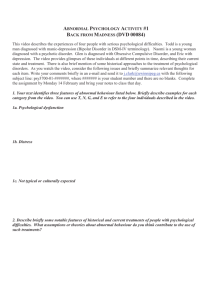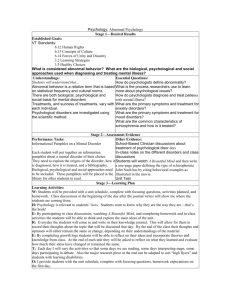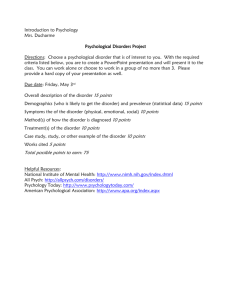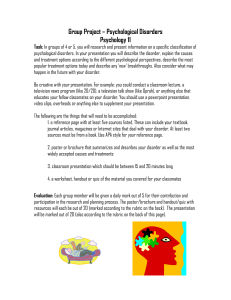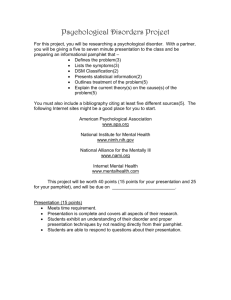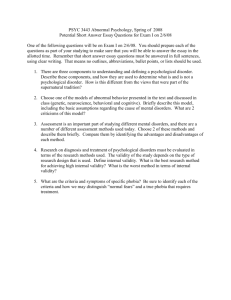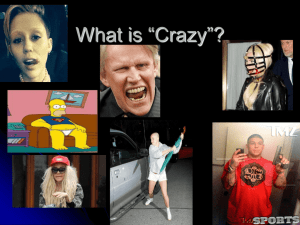abnormal psychology-definition
advertisement
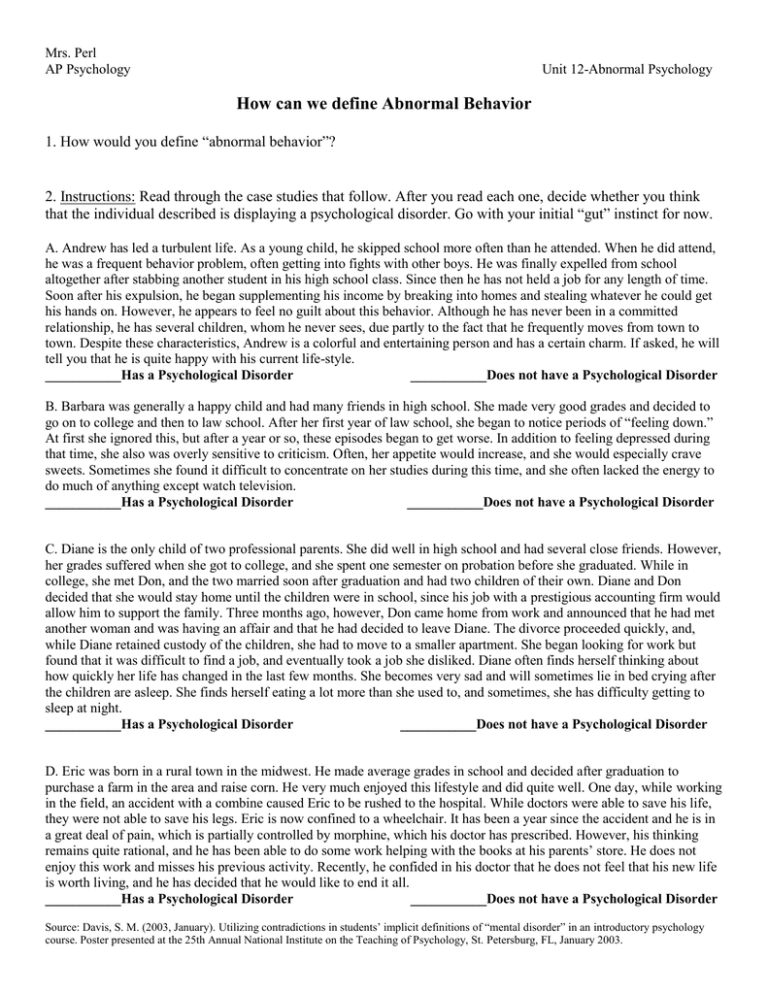
Mrs. Perl AP Psychology Unit 12-Abnormal Psychology How can we define Abnormal Behavior 1. How would you define “abnormal behavior”? 2. Instructions: Read through the case studies that follow. After you read each one, decide whether you think that the individual described is displaying a psychological disorder. Go with your initial “gut” instinct for now. A. Andrew has led a turbulent life. As a young child, he skipped school more often than he attended. When he did attend, he was a frequent behavior problem, often getting into fights with other boys. He was finally expelled from school altogether after stabbing another student in his high school class. Since then he has not held a job for any length of time. Soon after his expulsion, he began supplementing his income by breaking into homes and stealing whatever he could get his hands on. However, he appears to feel no guilt about this behavior. Although he has never been in a committed relationship, he has several children, whom he never sees, due partly to the fact that he frequently moves from town to town. Despite these characteristics, Andrew is a colorful and entertaining person and has a certain charm. If asked, he will tell you that he is quite happy with his current life-style. ___________Has a Psychological Disorder ___________Does not have a Psychological Disorder B. Barbara was generally a happy child and had many friends in high school. She made very good grades and decided to go on to college and then to law school. After her first year of law school, she began to notice periods of “feeling down.” At first she ignored this, but after a year or so, these episodes began to get worse. In addition to feeling depressed during that time, she also was overly sensitive to criticism. Often, her appetite would increase, and she would especially crave sweets. Sometimes she found it difficult to concentrate on her studies during this time, and she often lacked the energy to do much of anything except watch television. ___________Has a Psychological Disorder ___________Does not have a Psychological Disorder C. Diane is the only child of two professional parents. She did well in high school and had several close friends. However, her grades suffered when she got to college, and she spent one semester on probation before she graduated. While in college, she met Don, and the two married soon after graduation and had two children of their own. Diane and Don decided that she would stay home until the children were in school, since his job with a prestigious accounting firm would allow him to support the family. Three months ago, however, Don came home from work and announced that he had met another woman and was having an affair and that he had decided to leave Diane. The divorce proceeded quickly, and, while Diane retained custody of the children, she had to move to a smaller apartment. She began looking for work but found that it was difficult to find a job, and eventually took a job she disliked. Diane often finds herself thinking about how quickly her life has changed in the last few months. She becomes very sad and will sometimes lie in bed crying after the children are asleep. She finds herself eating a lot more than she used to, and sometimes, she has difficulty getting to sleep at night. ___________Has a Psychological Disorder ___________Does not have a Psychological Disorder D. Eric was born in a rural town in the midwest. He made average grades in school and decided after graduation to purchase a farm in the area and raise corn. He very much enjoyed this lifestyle and did quite well. One day, while working in the field, an accident with a combine caused Eric to be rushed to the hospital. While doctors were able to save his life, they were not able to save his legs. Eric is now confined to a wheelchair. It has been a year since the accident and he is in a great deal of pain, which is partially controlled by morphine, which his doctor has prescribed. However, his thinking remains quite rational, and he has been able to do some work helping with the books at his parents’ store. He does not enjoy this work and misses his previous activity. Recently, he confided in his doctor that he does not feel that his new life is worth living, and he has decided that he would like to end it all. ___________Has a Psychological Disorder ___________Does not have a Psychological Disorder Source: Davis, S. M. (2003, January). Utilizing contradictions in students’ implicit definitions of “mental disorder” in an introductory psychology course. Poster presented at the 25th Annual National Institute on the Teaching of Psychology, St. Petersburg, FL, January 2003. 3. Has this changed your definition of abnormal behavior at all? If so, in what way? 4. Potential elements of “abnormal behavior” Aspect of abnormal behavior AtypicalStatistical deviation Definition Problems/Issues with Definition DisturbingSocial norm violation Most of our behavior is shaped by norms - cultural expectations about the right and wrong way to do things. This therefore defines abnormal behavior as breaking unwritten social "rules". Maladaptive behavior Two aspects to this: 1) Maladaptive to one's self - inability to reach goals, to adapt to the demands of life, 2) maladaptive to society - interferes, disrupts social group functioning. Since many human characteristics are normally distributed, according to this idea the defining characteristic of abnormal behavior is an “uncommon behavior” that is a significant deviation from the average/majority. This type of definition allows much flexibility. It provides room for conforming behavior to society's norms as well as deviant behavior as long as it is not self-damaging. It makes abnormal a relative term that is dependent upon each individual's life and circumstances. Personal distress Put simply, if the person is content with his/her life, then s/he is of no concern to the mental health field. If, on the other hand, the person is distressed (depressed, anxious, etc), then those behaviors and thoughts that the person is unhappy about are abnormal behaviors and thoughts. Unjustifiable The elements of abnormal behavior cannot be justified by health factors, recent life events, or other medical explanations. Adapted from http://ccvillage.buffalo.edu/Abpsy/ Psychological Disorders are viewed as “harmful dysfunctions.” Something is a harmful dysfunction if it is atypical, disturbing, maladaptive, and unjustifiable.

